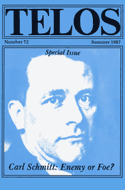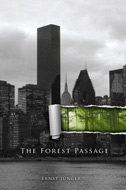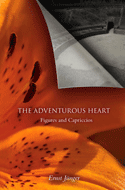By Telos Press · Wednesday, April 30, 2014 Gary Lachman, writing at the Daily Grail, has just posted a new review of Ernst Jünger’s The Forest Passage. Here’s an excerpt.
Continue reading →
By Linas Jokubaitis · Tuesday, December 3, 2013 As an occasional feature on TELOSscope, we highlight a past Telos article whose critical insights continue to illuminate our thinking and challenge our assumptions. Today, Linas Jokubaitis looks at Joseph Bendersky’s “Carl Schmitt and the Conservative Revolution” from Telos 72 (Summer 1987).
 In his last book, Political Theology II, Carl Schmitt wrote that some books are fated to become academic legends, but contrary to the etymological meaning of the word Legende, they are not read, only cited. He knew that his persona was surrounded by many mythologies and that after his death an even greater complex of mythologies would develop around his personality and works. Today there seems to be no end to the multiplication of legends about Schmitt. Joseph Bendersky’s essay “Carl Schmitt and the Conservative Revolution” is a meticulous attempt to understand if there is any truth in the popular legend, according to which Schmitt belonged to a diverse group of intellectuals who were labeled as conservative revolutionaries. In his last book, Political Theology II, Carl Schmitt wrote that some books are fated to become academic legends, but contrary to the etymological meaning of the word Legende, they are not read, only cited. He knew that his persona was surrounded by many mythologies and that after his death an even greater complex of mythologies would develop around his personality and works. Today there seems to be no end to the multiplication of legends about Schmitt. Joseph Bendersky’s essay “Carl Schmitt and the Conservative Revolution” is a meticulous attempt to understand if there is any truth in the popular legend, according to which Schmitt belonged to a diverse group of intellectuals who were labeled as conservative revolutionaries.
Continue reading →
By Telos Press · Monday, December 2, 2013  Telos Press is pleased to announce the publication of Ernst Jünger’s The Forest Passage, now available for purchase in our online store. Expertly translated by Thomas Friese, who previously translated Jünger’s The Adventurous Heart, and with an introduction by Russell A. Berman, this key text from Jünger’s oeuvre is finally accessible to English-language readers. Telos Press is pleased to announce the publication of Ernst Jünger’s The Forest Passage, now available for purchase in our online store. Expertly translated by Thomas Friese, who previously translated Jünger’s The Adventurous Heart, and with an introduction by Russell A. Berman, this key text from Jünger’s oeuvre is finally accessible to English-language readers.
Continue reading →
By Telos Press · Thursday, November 14, 2013 
Ernst Jünger’s The Forest Passage explores the possibility of resistance: how the independent thinker can withstand and oppose the power of the omnipresent state. No matter how extensive the technologies of surveillance become, the forest can shelter the rebel, and the rebel can strike back against tyranny. Jünger’s manifesto is a defense of freedom against the pressure to conform to political manipulation and artificial consensus. A response to the European experience under Nazism, Fascism, and Communism, The Forest Passage has lessons equally relevant for today, wherever an imposed uniformity threatens to stifle liberty
Continue reading →
By Telos Press · Saturday, January 26, 2013 An excerpt from Carl Abrahamsson’s recent review of Ernst Jünger’s The Adventurous Heart, published by Telos Press. Read the full review here.
 The Adventurous Heart is a perfect title for the book. Once inside, each page is like an adventure and it does indeed belong more in the sphere of the heart than in the rational mind. Strolling through nature—both the chlorophyllic and the human—Jünger ponders phenomena as well as his own conclusions in an intuitive way. Aloof, yes, but always intriguing enough to keep you hooked. It’s an unpredictable mystery, very subtly designed, and which works over and over and over (try re-reading On the Marble Cliffs or this one and see how much new stuff actually appears. A literary tricking of memory or simply a living, sentient text?). . . . The Adventurous Heart is a perfect title for the book. Once inside, each page is like an adventure and it does indeed belong more in the sphere of the heart than in the rational mind. Strolling through nature—both the chlorophyllic and the human—Jünger ponders phenomena as well as his own conclusions in an intuitive way. Aloof, yes, but always intriguing enough to keep you hooked. It’s an unpredictable mystery, very subtly designed, and which works over and over and over (try re-reading On the Marble Cliffs or this one and see how much new stuff actually appears. A literary tricking of memory or simply a living, sentient text?). . . .
Continue reading →
By Telos Press · Wednesday, December 19, 2012 Gary Lachman reviews Ernst Jünger’s The Adventurous Heart for Reality Sandwich:
 The Adventurous Heart is a collection of short essays, thoughts, stories, dreams, philosophical musings, and other unclassifiable writings on a number of experiences: nature, death, travel, sex, drugs, antique shops, museums, practically anything that caught Jünger’s ever inquisitive eye. It provides, as Jünger says, “small models of another way of seeing things.” This “other way” is what Jünger calls “stereoscopy,” the ability to see things in a dual aspect, perceiving their surface and depth simultaneously. . . . Jünger’s “stereoscopy” revealed to him the “secret correspondences existing between things,” and his reflections, written in an elegant, often lapidary style, trigger in the attentive reader a similar effect. The Adventurous Heart is a collection of short essays, thoughts, stories, dreams, philosophical musings, and other unclassifiable writings on a number of experiences: nature, death, travel, sex, drugs, antique shops, museums, practically anything that caught Jünger’s ever inquisitive eye. It provides, as Jünger says, “small models of another way of seeing things.” This “other way” is what Jünger calls “stereoscopy,” the ability to see things in a dual aspect, perceiving their surface and depth simultaneously. . . . Jünger’s “stereoscopy” revealed to him the “secret correspondences existing between things,” and his reflections, written in an elegant, often lapidary style, trigger in the attentive reader a similar effect.
Continue reading →
|
|
 In his last book, Political Theology II, Carl Schmitt wrote that some books are fated to become academic legends, but contrary to the etymological meaning of the word Legende, they are not read, only cited. He knew that his persona was surrounded by many mythologies and that after his death an even greater complex of mythologies would develop around his personality and works. Today there seems to be no end to the multiplication of legends about Schmitt. Joseph Bendersky’s essay “Carl Schmitt and the Conservative Revolution” is a meticulous attempt to understand if there is any truth in the popular legend, according to which Schmitt belonged to a diverse group of intellectuals who were labeled as conservative revolutionaries.
In his last book, Political Theology II, Carl Schmitt wrote that some books are fated to become academic legends, but contrary to the etymological meaning of the word Legende, they are not read, only cited. He knew that his persona was surrounded by many mythologies and that after his death an even greater complex of mythologies would develop around his personality and works. Today there seems to be no end to the multiplication of legends about Schmitt. Joseph Bendersky’s essay “Carl Schmitt and the Conservative Revolution” is a meticulous attempt to understand if there is any truth in the popular legend, according to which Schmitt belonged to a diverse group of intellectuals who were labeled as conservative revolutionaries.  Telos Press is pleased to announce the publication of Ernst Jünger’s The Forest Passage, now available for purchase in our
Telos Press is pleased to announce the publication of Ernst Jünger’s The Forest Passage, now available for purchase in our  The Adventurous Heart is a perfect title for the book. Once inside, each page is like an adventure and it does indeed belong more in the sphere of the heart than in the rational mind. Strolling through nature—both the chlorophyllic and the human—Jünger ponders phenomena as well as his own conclusions in an intuitive way. Aloof, yes, but always intriguing enough to keep you hooked. It’s an unpredictable mystery, very subtly designed, and which works over and over and over (try re-reading On the Marble Cliffs or this one and see how much new stuff actually appears. A literary tricking of memory or simply a living, sentient text?). . . .
The Adventurous Heart is a perfect title for the book. Once inside, each page is like an adventure and it does indeed belong more in the sphere of the heart than in the rational mind. Strolling through nature—both the chlorophyllic and the human—Jünger ponders phenomena as well as his own conclusions in an intuitive way. Aloof, yes, but always intriguing enough to keep you hooked. It’s an unpredictable mystery, very subtly designed, and which works over and over and over (try re-reading On the Marble Cliffs or this one and see how much new stuff actually appears. A literary tricking of memory or simply a living, sentient text?). . . .

